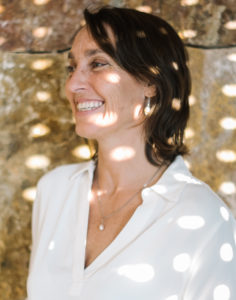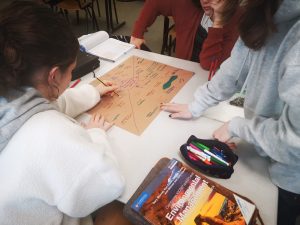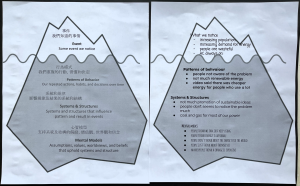I just spent the week at SXSW EDU 2024 in Austin. It was my first time attending and I was excited, maybe even a little bit intimidated by what it might be. Compass Education partnered with Dina Buchbinder of Education for Sharing to lead a networking session titled, Sustainability Educators and the SDGs: World Cafe Meetup!
I have facilitated a similar conversation for diverse groups around the world including tiny Mexican village communities and the global leaders of the World Economic Forum. Always, in these discussions, we push ourselves to think critically about our role and responsibility in building the world that we want to see and I was excited to bring together education leaders at SXSW to discuss the integration of sustainability and the SDGs in education. In the world cafe process, we place provocative questions in the center of the table and then each one of us takes our turn with the “talking stick” to share our unique perspective. Others’ listen to what we say and write down what most resonates for them. One of the questions that we asked was, “How could SXSW support achieving the sustainable outcomes aspired to by the SDGs?”. The reflections at this table came fast and frustrated…
At a conference with 508 sessions, less than 1% (yes, you read that right) had a theme reflecting environmental sustainability or climate change. How could a conference of this size and stature seemingly completely ignore what is arguably the greatest challenge of our times?
As I strolled the air-conditioned hallways and refused the multitudes of free giveaways in the exhibition hall, passed the plastic-wrapped concrete pillars (in all of downtown) or bought my takeaway food in a plastic cup, I couldn’t help but shake my head and wonder if I was the only one who was feeling the dissonance. Dozens of workshops in this conference reflected themes of diversity, inclusion and social justice and I felt challenged by the narrative of who gets justice, do we ever consider nature? Do we consider the massive impact of thousands of people descending on the city or the factory workers in faraway countries that construct our throwaway bling? The cloth bag swag to carry it all was nice, but where did it come from and who or what was sacrificed along the way?
Today, climate change is considered one of the world’s most daunting challenges with an outsized impact in youth and education. The most recent UN report states that 1 billion children are at extremely high risk of being affected by the climate crisis, calling it a “threat multiplier” for violence against children and recognizing climate anxiety as a critical mental health concern. I recognize that SXSW is designed for a US audience but are we truly so insulated, or so self absorbed that we cannot find the value, or the compassion to think about the world? Are we choosing to be naive to not identify our systemic role in so many of the crises facing the world today? If we look away long enough will it go away? As educators, those responsible for shaping the minds of our future leaders, shouldn’t we care?
While I was grabbing lunch between sessions I listened to the renowned author and scholar Margaret Wheatley share her views in a podcast episode, Creating Islands of Sanity. She said that one of the strongest indicators of a civilization in decline was when those in power took all the power for themselves with no regard for others. Is this what is happening at a US education conference when we blatantly disregard a global community that is in turmoil? When the hot topic in education includes intelligence that is “artificial,” are we actively turning our backs on what is real? Margaret Wheatly suggests that it’s all a waiting game now, that we hold tight and find a few like-minded people to band together to build “islands of sanity” while we wait out the storm, or in this case, the failure of society as we know it. My head believes she might be right, but my heart won’t give up so easily.
One of the sessions that I attended was a panel discussion about Engaging GenZ in Socially Conscious Entrepreneurship. The clearly articulated challenge was that GenZ doesn’t believe that school is preparing them for the world that we live in. The panelists were organizational leaders, working with a tiny subset of the student population in the United States and demonstrating that there were ways to do education differently, to build entrepreneurial mindsets, to collectively empower students from disadvantaged backgrounds, to include the topics that are most relevant today and to create education ecosystems that grow students as agents of change. I was uplifted by the message, the quality of the presenters and the possibility represented in their collaboration. Are these the islands of sanity that Margaret Wheatley is suggesting that we find? Is it the educators who joined our world cafe and spent 60 min on their feet engaged in conversation about the SDGs, each table its own, momentary island? Is it the Foundations in my final session of the conference, How Disruptive Philanthropy is Reshaping the Face of Giving, who are working hard to support thoughtful and systemic work, and those that work across cultures and communities, are these the buoys of our broken education system? Should we hold on with both hands and band together to build together a lifeline, a lifeboat to weather this storm, metaphorical and quite literal too?
Although it might seem as such, I am not unhappy or even disappointed in the conference. In fact, I was surprised at how much I enjoyed the workshops I attended, the people I met and networked with and the conversations that I was able to explore. I felt that I was walking among “my people,” educators, organizational leaders, funders and thought leaders. But I can’t help but wonder how it is that all these great people can seemingly collectively look away from the world as we know it? How is it that we (myself included) somehow failed to create a collective call for SXSW EDU to include conversations in recognition of the global challenges that we face and in support of a sustainable world? I know that I can do better and I challenge all of us who attended and all of us who care, to gather together as islands of sanity, a place of both refuge and potential, to invite SXSW EDU 2025 to lead by example in showcasing the voices and actions that will lead to a more sustainable, compassionate and equitable world.

Author

Nicole Swedlow
Nicole Swedlow is the Executive Director of Compass Education, a global non-profit supporting education for sustainability through training in systems thinking practices. As a consultant, she is passionate about helping schools and businesses integrate sustainable principles with a strategic, inclusive and conscious approach. Nicole’s work in nonprofit leadership and sustainability as Director of the nonprofit organization Entreamigos, has been recognized by the United Nations, as a finalist for the Global Equator Initiative, as a breakout speaker for the World Economic Forum, and by the Dalai Lama, as a 2014 Unsung Hero of Compassion. Nicole has a Masters Degree in Education and Global Change from the University of British Columbia.






